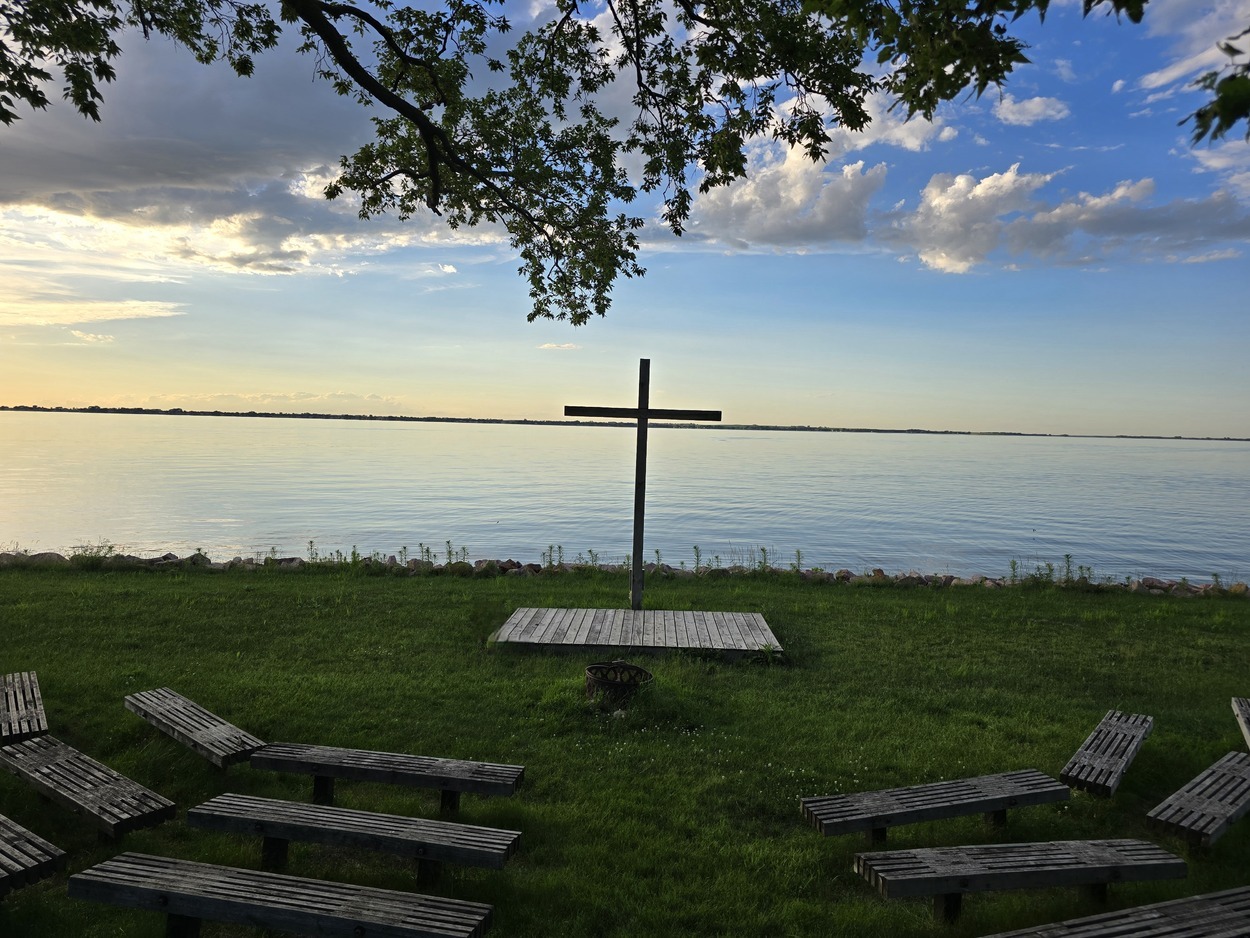
Dakotas Conference hosts Licensing School

Six candidates representing the Dakotas and Minnesota Conferences gathered for five days at Living Waters Retreat Center at Lake Poinsett, near Arlington, South Dakota, for the 2024 licensed local pastor school.
Students were led by six faculty (dubbed the “Dream Team” by licensing school dean, Rev. Annie Carlson) teaching seven different courses:
· Rev. Annie Carlson, dean of licensing school, Worship and Preaching, Pastoral Self-Care
· Rev. Dayne Zachrison, assistant dean, Discipleship
· Rev. Scott McKirdy, Mission & Evangelism
· Dr. John Anderson, Introduction to the Bible, Worship and Preaching
· Rev. Dr. Marilyn Spurrell, Pastoral Care
· Rev. Duane Coates, Administration, United Methodism
Reflecting on a faithful and fulfilling time together, Dean Annie Carlson said, “With an all-star faculty and the beautiful Lake Poinsett Camp as our host, it was a wonderful time of learning and fellowship as we launched six new Licensed Local Pastors into the Minnesota and Dakotas Conferences.”
Licensing school is an intensive, week-long “boot camp” or “crash course” on all topics and aspects related to being a pastor. The goal of licensing school is to equip students—who do not (yet) have a seminary degree but feel called to ministry—with the most vital information, tools, resources, and learning to aid their success in a pastoral appointment on day one.
Students had opportunities to learn not just the “what” of content but also the very practical “how” of pastoral ministry: how do I preach an effective sermon? How do I do a baptism or a funeral? How do I wrestle with the Bible? How do I cultivate discipleship? How do I engage in meaningful pastoral and self-care? How do I reach new people? How do I utilize the Book of Discipline as a guide? Sensitivity to one’s unique ministry context was emphasized, as well as the importance of authenticity in the pastoral appointment; students should know their contexts well and be authentic to who they are and where God has called them to be.
Each day of licensing school began at 7:30 a.m. with morning prayer, song, and a sermon from one of the students. Each day would end at 8:30 p.m. with vespers and another opportunity for a student to preach. Classes were held all day in-between, with breaks for meals and mid-day prayer. Even though the day’s scheduled activities concluded at 9p.m., conversation and collegiality often continued well into the night.
But the learning began several weeks before participants arrived at Lake Poinsett. Two months prior, the faculty submitted their syllabi with required pre-work, including reading, video lectures, writing reflections, preparation of a sermon series, responding to scenarios according to the Book of Discipline, and many other assignments due before the in-person gathering. To aid and support students during this time, virtual office hours were held each Tuesday evening to answer questions and provide an initial introduction to one another.
The faculty, as well as the Board of Ordained Ministry, continue to walk alongside each candidate as they navigate their ministry journey. Relationships built during this time together create a strong support and camaraderie in each year’s class.
Participants this year were Paul Plueddeman, Erin Balbach, Lisa Luft, George Keehner, Jess Hansen, and Cindi Chollett. Their anticipated ministry contexts were diverse, from working with those experiencing addiction or incarceration, to lay ministry or appointment at a local church. There were instant connections discovered among this diverse group, and by the time the week was over, many new relationships had formed.
Licensed local pastors (LLP) are not ordained, but are licensed to preach, lead worship, administer the sacraments, and perform all duties of a pastor within a specific pastoral appointment or extension ministry. In his closing remarks to the group, Dr. John Anderson, pastor and LLP serving Spirit of Faith in Woonsocket, South Dakota, said, “The church is in good hands with people like you answering the call! I’m thrilled to be able to do ministry alongside you all.”
The first step for anyone feeling called to pursue licensing as a local pastor is to contact your district superintendent, making your intention known. Successful completion of licensing school follows, along with approval of licensing during clergy session at Annual Conference. Candidates are then able to receive an appointment from the bishop.
Licensing school also is not the end of an LLP’s education; it is just the first step. Practically speaking, while serving under appointment to a local church continues one’s learning in real-time, the licensed local pastor is also required to continue their education in future years through the Course of Study program offered at various seminaries. There are also pathways for an LLP to pursue certified candidacy and ordination as an elder or deacon.
Erin Balbach, one of the participants from the Minnesota Conference who serves Communities of Faith—Eagle Bend, Clarissa, and Clotho, as well as Peace United, offered these inspiring words of reflection: “I came into my week of licensing school overwhelmed —an understatement, and unsure if I was even on the right road despite all the prayers, encouragement, and discernment. With the help of the most amazing teachers and spending time in class building relationships, my heart has been re-encouraged to continue. The days were packed, and my brain was sometimes on overload—but in a good way! I mean, who doesn’t want their brain full to the brim of all that fantastic Bible knowledge?! I certainly do not have the answer for everything as I forge ahead on this path of LLP, but now I have a few more amazing people in my corner to help and more knowledge and resources. I have built relationships that I will carry with me throughout my time in ministry, people to help in word and wisdom. And for that I am forever grateful.”
Interested in becoming a licensed local pastor? Learn more:
Ministry of Local Licensed Pastors
Dakotas Conference Board of Ordained Ministry
Guide to Candidacy
Steps to Become a Licensed Local Pastor